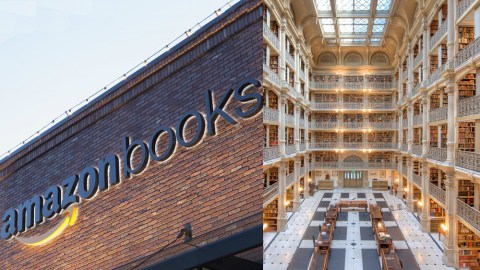Economist causes controversy: ‘Replace public libraries with Amazon bookstores’

UPDATE: According to Quartz, Forbes deleted the “deeply misinformed” op-ed on July 23, 2018, citing that it was written outside of the contributor’s area of expertise.
Libraries, once an important public resource, are outdated, costly and should be replaced by Amazon book stores. That’s the controversial argument from economist Panos Mourdoukoutas published in a recent Forbes article.
“At the core, Amazon has provided something better than a local library without the tax fees,” Mourdoukoutas, a professor of economics at LIU Post in New York, wrote. “This is why Amazon should replace local libraries. The move would save taxpayers money and enhance the stockholder value of Amazon all in one fell swoop.”
Mourdoukoutas argued that libraries were once a comfortable place to read, but now readers can just take their books to Starbucks. He also wrote that technology has turned physical books into “collector’s items, effectively eliminating the need for library borrowing services.”
Unsurprisingly, librarians and public library supporters took him to task on Twitter.
Maybe @Forbes doesn’t like that you can download their magazine free with your #SF library card. https://t.co/vqQk1BDMZE
— SF Public Library (@SFPublicLibrary) July 22, 2018
Historically those with power overtly protected their position by keeping oppressed communities illiterate. This idea is a modern reincarnation. Libraries serve POC, the poor, etc. They are where people apply for citizenship, register to vote, access social programs. https://t.co/4BGS3yhorz
— Sofia Quintero (@sofiaquintero) July 22, 2018
Cost to individually buy the six books I have on hold this week: $70
Amount the Altadena Library Special Parcel Tax cost me this week: 75¢
Someone help me budget this, I’m not the chair of an economics department.
— Gwen C. Katz (@gwenckatz) July 21, 2018
Cost to individually buy the six books I have on hold this week: $70
Amount the Altadena Library Special Parcel Tax cost me this week: 75¢
Someone help me budget this, I’m not the chair of an economics department.
— Gwen C. Katz (@gwenckatz) July 21, 2018
Public library funding
Most libraries are funded by local governments, typically through property taxes, and also from state and federal funds. The average taxpayer pays about $4.50 per month to fund local libraries, according to some estimates, though this figure varies by local tax rates.
In recent years, some libraries have had to seek funding from other sources, like philanthropy, renting out space for money, offering for-profit services like processing passport applications, and selling goods like USB drives and coffee.

It’s hard to measure the exact monetary benefits of public libraries, but estimates provide an idea. The St. Johns County Public Library System in Florida, for example, estimates that taxpayers receive about $10 for every $1 they spend on libraries. These benefits come in the form of free (or low-cost) access to:
- Books and reference materials for private or professional study
- Expensive market research databases
- Computers and printers low-income residents can use to apply for jobs
- Classes and workshops
- Resources for U.S. veterans
- Spaces for community meetings
- Librarians, many of whom have specialized master’s degrees
- Jobs provided to the community
Amazon, a giant for-profit company that got its start as a bookseller, would have little incentive to provide these resources, many of which are intangible.
“Libraries are community spaces where children come in order to learn to read and get a head start on learning,” reads a recent piece from EveryLibrary, a nonprofit organization that helps libraries secure funding. “They are places where adults can get the help they need to explore an increasingly complex digital and information driven work environment. Veterans returning from overseas can attend programs to help them gain access to critical services. Small business owners and entrepreneurs can access global market databases like Gale Business Insights and use ReferenceUSA and AtoZ Databases to find new leads. Children can play with stem toys to learn how to engage with the latest technologies and gain the skills they’ll need in the workforce. They do all of this and whole lot more, for a lot less than Amazon or any other organization in the country.”





